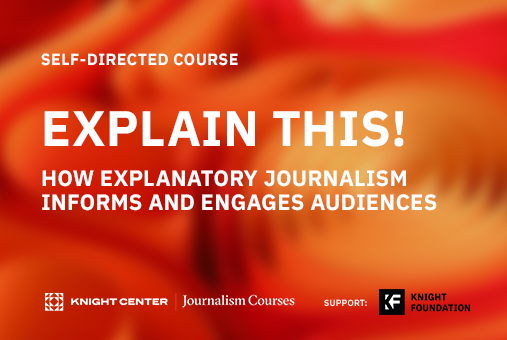What is explanatory journalism and how can it improve your journalism?
Learn the answers thanks to a free, self-directed online course from the Knight Center for Journalism in the Americas. This new program is based on the successful massive open online course (MOOC) offered earlier this year that reached more than 3,000 people from 153 countries.
 “Explain this! How explanatory journalism informs and engages audiences” is now available to be taken any time, from anywhere, and at your own pace. Check it out today!
“Explain this! How explanatory journalism informs and engages audiences” is now available to be taken any time, from anywhere, and at your own pace. Check it out today!
In the four modules of this program, students learn how to spot subjects where readers can benefit from explanatory journalism, figure out how to add context and background to clarify the news, and create “persistent content” to fight misinformation.
The course instructor is veteran New York City-based journalist John O’Neil, an editor with Bloomberg News who has developed new formats for explanatory news and is a member of the “Bloomberg QuickTake” team. QuickTakes are readable, authoritative pages that provide readers with background and context on current events.
The modules consist of video classes, presentation slides, transcripts, readings and optional resources.
Each week of the course focuses on a particular module.
O’Neil is also joined by guest speakers, including:
“Explain This” was initially offered as a massive open online course (MOOC) and ran from Jan. 16 to Feb. 12, 2023. It attracted 3,284 students and was offered for free thanks to support from the Knight Foundation.
“‘Explain This’ drew together a community of over 3,000 students from more than 150 countries, a group that included writers and editors in large newsrooms, freelancers, journalism professors and people writing for non-profits and even public relations firms,” O’Neil said. “In the online discussions this diverse group voiced a common belief -- that improving their ability to explain the things they're writing about (or making videos, podcasts or graphics about) is essential to serving readers, especially at a time of increased misinformation.”
Katerina Bakogianni, head of podcasts at Alter Ego Media, said she signed up for the course while developing the first daily news podcast in Greece, “a daily explainer and an in-depth look on current issues or articles highlighted in print in the newspaper of our media group.”
“I found the course useful, to the point and passed all the information to the team working for the podcast,” she said.
MOOCs offer interaction with instructors and attract thousands of students. Once a MOOC is over, the Knight Center repurposes them as self-directed courses that can be taken at any time, from anywhere in the world, and at the student’s own pace. While MOOCs are open only for a relatively short period of time, self-directed courses are open indefinitely and can be accessed by students who need a refresher or are coming to the topic for the first time.
So, enhance your journalism skills by taking this exciting self-directed course on explanatory journalism today! And while you’re at journalismcourses.org, check out our extensive library of multilingual self-directed courses on topics like mental health, covering the climate crisis, entrepreneurial journalism, and more.